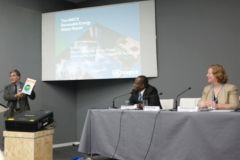UNECE Renewable Energy Status Report 2015

According to the report, readiness to invest in renewable energies has fallen in the Balkans, Caucasus, Eastern Europe and Central Asia.
The recently published UNECE Renewable Energy Status Report 2015 provides a comprehensive overview of the current status of renewable energies for a total of 17 countries in the Balkans, Caucasus, Eastern Europe and Central Asia. In this context, it also describes the energy markets, industry, policies, framework conditions and investment activities in the region. On the one hand the report's findings show that the proportion of renewable energies – in relation to the total energy consumption of the selected countries – is quite high. On the other hand, investments in renewable energies in the regions have dropped significantly in recent years and are relatively far behind compared to the rest of the world. Although the region comprises 300 million people and represents 4.9% of global GDP, only a fraction of global investments in renewable energies are made in the region despite its high potential. In 2014 the proportion was 0.5%, which is USD 0.9 billion. One of the greatest challenges is therefore boosting investment in renewable energies in these countries.
The report was prepared by the international network REN21 (Renewable Energy Policy Network for the 21st Century) and presented on 7 December 2015 by Scott Foster, Director of the Sustainable Energy Division of UNECE in the EU Pavilion at the United Nations Climate Change Conference in Paris. REN21 is a global multi-stakeholder network specialising in renewable energies and energy policy. The Paris-based network is embedded in the United Nations Environment Programme. REN21 received considerable support in preparing the status report as part of the regional GIZ programme 'Capacity Development for Climate Policy in the Western Balkans, Central and Eastern Europe and Central Asia', which is supported by BMUB’s International Climate Initiative (IKI). REN21 follows the global development of renewable energies and publishes an annual comprehensive report.
The status report was prepared in close cooperation with the Group of Experts on Renewable Energy (GERE) and the Committee on Sustainable Energy (CSE). GERE and CSE were commissioned for this work by the United Nations Economic Commission for Europe (UNECE). As part of its mandate, the GERE working group supports the preparation of background information, best practices, and policy and legal advisory services for the renewable energy sector in the UNECE member states. The report will serve as a basis for future activities related to renewable energies and energy efficiency in the region for UNECE and other actors.
While the Status Report documents the current state of affairs in the region, another project running in parallel is already providing a look into the future. In cooperation with IRENA, UNECE and the Energy Community Secretariat, the GIZ regional programme supports the preparation of potential analyses to identify opportunities for expanding the use of renewable energies in the countries in the Energy Community of South East Europe. The results are expected by the end of the project in September 2016.
The link has been copied to the clipboard
Contact
IKI Office
Zukunft – Umwelt – Gesellschaft (ZUG) gGmbH
Stresemannstraße 69-71
10963 Berlin




![[Translate to English:]](/legacy/_processed_/0/d/csm_181102_Albanien_FiKiBio_656_9fa7345f1d.jpg)




